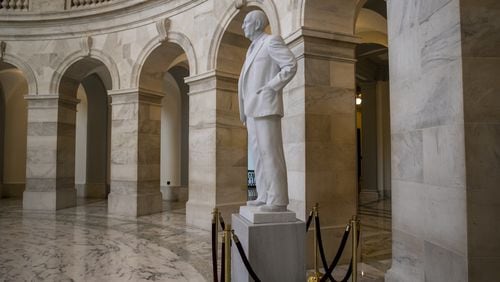An effort to rename Georgia U.S. Sen. Richard B. Russell’s namesake building on Capitol Hill in honor of John McCain hit a speed bump on Tuesday.
Senate Majority Leader Mitch McConnell, R-Ky., declined to endorse the proposal being spearheaded by his Democratic counterpart, Senate Minority Leader Chuck Schumer of New York. He instead announced the creation of a bipartisan task force to brainstorm ways to ensure “a suitable, lasting tribute” to the late Arizona Republican, who lost his battle with brain cancer last weekend.
“The Senate is eager to work on concrete ways to continue this momentum and provide a lasting tribute to this American hero long after this week’s observances are complete,” McConnell said, referring to McCain’s cross-country funeral procession.
McConnell floated several potential ideas for honoring McCain on Capitol Hill. They included naming the chamber’s Armed Services Committee hearing room after the Vietnam veteran and hanging his portrait in a prime reception room that’s considered the Senate’s unofficial hall of fame. Missing from the list was the proposal to rename the Russell Building, where McCain’s staff and both of Georgia’s U.S. senators have offices.
Schumer and roughly a dozen Senate colleagues, including several Republicans, endorsed the idea of renaming the Constitution Avenue edifice in McCain’s honor in the days following his death. Multiple Democrats went a step further, saying Russell should no longer be memorialized there because of his segregationist views.
“It’s time that we recognize that as times change, so do our heroes,” said Schumer, who later circulated a letter asking colleagues for their support.
Russell was a Georgia House speaker and governor before his election to the U.S. Senate in 1932. There, the Democrat became a leading voice on national defense issues and safety-net programs, as well as an informal adviser to several presidents. He was also a master of the chamber’s rules, which he used to stymie civil rights and voting rights legislation.
“He was very much a representative of the views of Georgians — of white Georgians, anyway — and Southerners until probably the late 1950s,” said Charles Bullock, a political science professor at the University of Georgia whose position is named in honor of Russell.
Some Republicans said they were wary of politicizing McCain’s death given recent fights over Confederate symbols across the U.S. And Russell’s defenders in Georgia said the legendary senator should still be revered despite his views on segregation.
“This is a guy that was a giant of the Senate,” said U.S. Sen. David Perdue, R-Ga., who uses Russell’s old mahogany desk in the Senate chamber. “So this renaming thing because of one issue, you know, is somewhat troubling.”
Both he and U.S. Sen. Johnny Isakson, R-Ga., endorsed the approach that McConnell laid out Tuesday.
“I’m predisposed to say that renaming that building is a serious issue, but I believe right now it’s premature to even talk about that until we see what the options are,” Perdue said.
A resolution renaming the Russell Building would require the approval of the Senate, but unlike regular legislation, it would not need to be approved by the House or signed by the president.
Former Georgia U.S. Sen. Saxby Chambliss served with McCain on the Armed Services Committee and worked with him on other issues such as immigration. The Republican said he wanted to see McCain honored “in a very high-profile way” but that renaming buildings sets a “precedent that’s going to be very difficult to live with.”
“Richard Russell’s name is synonymous with the history of the United States Senate,” Chambliss said, “so I think that sort of memorialization of John by taking somebody’s name off a building merits a lot of discussion down the road.”
Richard B. Russell Jr. (1897-1971)
- Russell served in public office for 50 years as a state legislator, governor of Georgia and U.S. senator.
- Today, Russell may be best known as the leader of Southern senators who opposed civil rights legislation, including the Civil Rights Act of 1964. Through a masterful command of parliamentary procedure, he blocked civil rights legislation, including anti-lynching bills, as far back as 1935.
- He's left a lasting mark on Georgia. Using his positions as chairman of the Senate Armed Services Committee and as a member of the Senate Appropriations Committee, Russell helped to secure or maintain 15 military installations in the state and more than 25 research facilities, including the U.S. Centers for Disease Control and Prevention.
- Russell believed that his most important legislative contribution was his authorship and secured passage of the National School Lunch Program in 1946.
- A year after his death in 1971, Russell's colleagues voted to name the building that housed his office in Washington the Richard Brevard Russell Senate Office Building.
Stay on top of what’s happening in Georgia government and politics at ajc.com/politics.
About the Author








